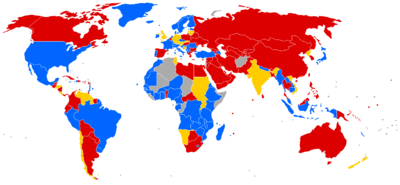HIV-positive people

HIV-positive people are people who have the human immunodeficiency virus HIV, the agent of the currently incurable disease AIDS.
Over the years of coping with the stigma and discrimination that accompany the diagnosis in most societies, a large number of support groups have been formed. In these groups, the term most often applied to people who are HIV positive is "People Living With HIV/AIDS". This is often abbreviated as "PLWHA" or "PLHIV". Recently, "People Living Positively" has also been used.[1]
The largest and oldest of the worldwide networks of people living with HIV is the Global Network of People Living With HIV/AIDS (GNP+), which has affiliate networks on every continent.
According to estimates by WHO and UNAIDS, 34.2 million people were living with HIV at the end of 2011. That same year, some 2.5 million people became newly infected, and 1.7 million died of AIDS-related causes, including 230 000 children. More than two-thirds of new HIV infections are in sub-Saharan Africa.[2] However, fewer than 20% of them are actually aware of the infection. Infection with HIV is determined by an HIV test.
HIV-positive people are often discriminated against because of (often unfounded) fears of infection and because the infection is negatively associated with promiscuity, homosexuality, and drug addiction. In addition, fear-based HIV prevention campaigns can intensify the stigma against HIV-positive individuals. In recent years, the rights of HIV-positive people have been a major source of debate and controversy.
See also
- UNAIDS
- List of HIV-positive people
References
External links
- HIV travel restrictions and retreats: http://plhiv.org
- ILGA.org: international organisation militating against all legal discriminations of travel and residence in the world against people infected by HIV or in AIDS diseases.
- HIV/AIDS Regulations The yearly information report for travellers with HIV/AIDS.
- AIDSmap: information portal on AIDS and the associated legislations in the world
- (French) Survey about discriminations against people living with HIV, 2005 – SIDA Information Service, France
- (French) sidaventure.net: website of an association fighting discriminations against VIH holders.
| ||||||||||||||||||||||||||||||||||||||||||||||||||||||||||||||||||||||||||||||||||||||||